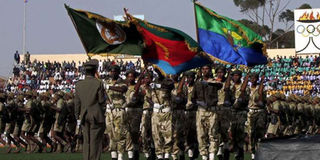Old friends Eritrea and Ethiopia ready for war

Eritrean soldiers parade during the young country's 16th Independence day celebrations in Asmara on May 24, 2007. Eritrea has said it killed more than 200 Ethiopians in a battle last week, one of the fiercest border clashes since a 1998-2000 war PHOTO | AFP
What you need to know:
- Because of the war, Ethiopia stopped using the closest and cheapest Assab Port of Eritrea and was forced to open a new revenue stream for the tiny nation, Djibouti.
- It was Eritrea’s information ministry that issued the first statement accusing Ethiopia of wagging war against Eritrea.
ADDIS ABABA
After Eritrea became an independent nation in 1993, the country was doing well economically and politically. In fact, at one point it became a top coffee exporter in Africa without planting a single coffee tree.
The Tigray Peoples Liberation Front (TPLF), which is one of the dominant parties in the coalition that has been leading Ethiopia since it overthrew the Marxist Dergue Regime in 1991 in collaboration with the Eritrean People Liberation (EPLF), has also been leading Eritrea since independence.
The reason the two countries went to war in May 1998, which resulted in the death of at least 70,000 people, is beyond border conflict, according to many researches done on the issue.
Because of the war, Ethiopia stopped using the closest and cheapest Assab Port of Eritrea and was forced to open a new revenue stream for the tiny nation, Djibouti, which now earns a couple of millions of dollars every day opening its port facilities to Ethiopia.
At some point as result of the vague relationship between the leadership of these two old friends, Eritrea was exporting Ethiopian coffee as if it was produced in Eritrea.
“For roughly three years following Eritrea’s secession from Meles Zenawi’s’ Ethiopia, there appears to have been no serious discourse bilateral discourse. Isayas Afeworki and the late Meles – these guerrilla allies turned heads of state – had consistently managed on a highly personal, cordial basis.
But, relations between the two governments began to unravel in 1997 [just one year ahead of the deadly war],” Mr Kevin Hamilton, writes in his 135 pages paper, Beyond the border war: The Ethio-Eritrea conflict published by Princeton University of the United States.
Even after the war ended in June 2000 after ‘the Algiers agreement’, they haven’t been able to restore peace.
"Eritrea blames Ethiopia for not willing to implement the agreement. Since then the two nations have been ‘neither in peace nor in war’, as many described it. There have been several reports of small scale border clashes between the soldiers of the two nations along their borders.
The incident reported last weekend is the major one after the bloody war between the two old friends.
“There was incident on Ethiopia- Eritrea border. The incident led to major engagement between our two forces,” Mr Getachew Reda, Ethiopia’s Minister of Government Communication Affairs, confirmed at the press conference in Addis Ababa on Wednesday.
ACCUSATIONS
It was Eritrea’s information ministry that issued the first statement accusing Ethiopia of wagging war against Eritrea.
“The TPLF regime has today, Sunday 12 June 2016, unleashed an attack against Eritrea on the Tsorona Central Front. The purpose and ramifications of this attack are not clear. The Government of Eritrea will issue further statements on the unfolding situation,” the ministry issued statement from Asmara on Monday.
During the press conference, which is dominated by the recent incident between the Ethiopia and Eritrea clash, Minister Getachew said that it was Eritrea who fired first and provoked Ethiopia to launch major counter attack.
From the statement of the minister one can guess that Eritrea is using different tactics to overstretch Ethiopian army by supporting and dispatching Ethiopian opposition fighters, which the government calls terrorists, in different directions.
“They [the Eritreans] used to send people through Tigray and Amhara Regions, which was the staple for most of their operations through Ginbot 7 or the alphabet soup of self-styled Ethiopian liberation movements here and there. Now they have changed tactic and they are trying to send elements through unusual directions - South, Southwest.
So, we believe that the measure that we took the last two days will send sufficiently clear message to the regime,” Mr Getachew said.
Ethiopia has been accusing the Isayas regime for training and providing weapons for Ethiopian oppositions, which the government labelled as terrorist organisations, which among others includes, Oromo Liberation Front (OLF), Ogaden National Liberation Front (ONLF), Ginbot 7 and Al Shabaab.
Likewise, Eritrea has also been accusing Ethiopia for hosting the Eritrean Democratic Alliance, which is a group of 13 political groups working to end Isayas’ regime.
Stating that if Eritrea limits ‘its nasty behaviour to itself’, it is none of Ethiopia’s business, Getachew said: “We sympathize with the people of Eritrea. We would be extending whatever support is necessary to help Eritreans get rid of the tyrant regime. But it is not for us to change the regime directly. Getting rid of the tyrant regime is not our duty,” Minister Getachew said.




